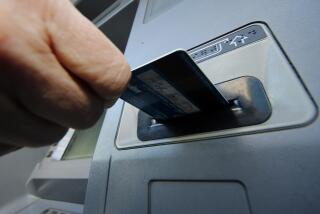Guilty Plea in Money Wiring
- Share via
An Ethiopian man has pleaded guilty and another has been indicted in the investigation of a money-wiring business that authorities said was used to illegally transfer $1.6 million to the Middle East.
Ali Abdurahman, 37, pleaded guilty in U.S. District Court in Santa Ana this week to federal charges of operating an unlicensed wire business. Authorities said he operated a hawala, an underground banking system commonly used in the Middle East, Africa and Asia to move money with few or no records of the transaction.
In an indictment unsealed this week, Abubakar Baharun, 37, was charged with five counts of bank fraud and check kiting. Authorities allege that Baharun stole at least $500,000 from banks in Las Vegas and Orange County and that some of those funds were transferred by Abdurahman to Dubai in the United Arab Emirates.
Both men are Ethiopian nationals and free on bond. Abdurahman could be sentenced to five years in prison, said Virginia Kice, a U.S. Immigration and Customs Enforcement spokeswoman. Baharun, who lives in Los Angeles, is awaiting trial, she said.
Abdurahman, who lives in Santa Ana, advertised his services by word of mouth in the Ethiopian community and had operated his business for several years before authorities opened an investigation, said Kumar Kibble, an immigration agent who supervised the case.
Abdurahman gave people who wanted money sent overseas the numbers of his U.S. bank accounts, and they would deposit funds in them.
Then every few weeks, Abdurahman would wire between $40,000 and $50,000 to an individual in Dubai, said Kibble.
The unidentified man, who has not been charged, would then forward the money to the intended recipients, he said.
Typically, Abdurahman charged $10 per transaction, but investigators believe he also used currency exchange rates to profit further, Kibble said.
Abdurahman had more than $2.4 million deposited at various banks in Orange County and Las Vegas while he was under investigation from October 2001 to August 2003, Kibble said.
Terrorists have used hawalas to transfer money internationally, because the system leaves virtually no paper trail. But Kibble said investigators found no evidence linking Abdurahman or Baharun to terrorism.
The investigation of unlicensed wire transmittal businesses, including hawalas, became a priority after the Sept. 11 attacks.
More to Read
Sign up for Essential California
The most important California stories and recommendations in your inbox every morning.
You may occasionally receive promotional content from the Los Angeles Times.













